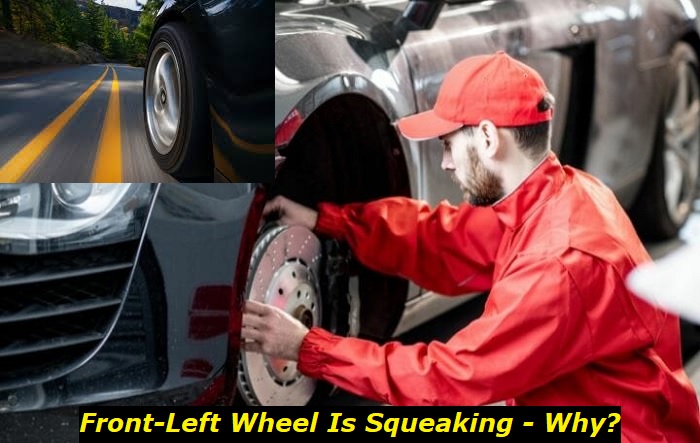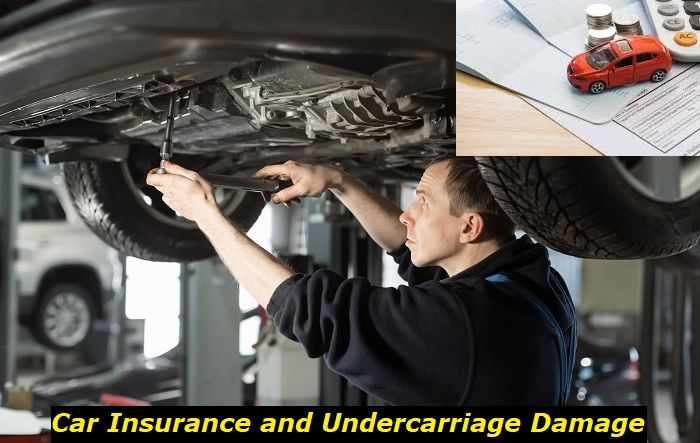Your front left wheel may squeak because of worn-out bearings, destroyed joint cover, brake pads issues, damaged wheel rim or tire, and also suspension issues. Different types and the intensity of the noise will help you diagnose the problem.
Front suspension problems highlights
- Level of importance:high
- Common reasons:road potholes, speed bumps, age, mileage
- DIY inspection:possible but complicated
- DIY repair:usually,impossible
- Average price in shops:$250 - $800
- Average time:2 - 8 hours
- If ignored:fatal failure, no drive, expensive repairs

Symptoms of the squeaking front wheel and types of noise
By understanding the type of squeaking noise and the special symptoms, you can identify a certain range of problems that is possible in your situation. Understanding what's going on with your car may seem much harder than it actually is.
For example, if the squeaking is irregular and occurs in those cases only when you go on some road imperfections and potholes, you may bet that the problem is with one of the suspension parts. But if the sound is rhythmic, it's most likely connected to the rotation of the wheel. In this case, you should look at the brakes, tire, or maybe the bearing.
Also, you will need to register if the noise changes when you turn. Bearings and brakes don't change their functions when the wheel is turned, but if the problem is with the tire, for example, the turn of the wheel changes everything.
You will want to make sure that the sound actually comes from your left wheel. Open and close windows, and try to switch off the climate system to make sure it's not the fan or something else. But, at this point, you will still not be able to identify the problem and you will have to get your hands dirty and inspect the wheel itself.
What are the possible reasons for the squeaking front wheel?
We have to differentiate between rhythmic and chaotic sounds. If the sound doesn't have any pattern and mostly occurs when you drive on a bad road, here are the most obvious reasons for this issue:
- your shock absorber is dead or dying and squeaks every time it is squeezed by the weight of the car;
- the strut is dying and making this sound every time it needs to move and compensate for any impacts;
- one of the bushings in your suspension is worn out and needs to be replaced.
But, in most cases, when drivers are talking about squeaking sounds, they mean rhythmic sounds and it seems that these sounds are connected to the spinning of the wheel. The faster it spins, the higher the frequency of squeaking. If this is the case, read further to find out about the most common causes for this:
1. Your wheel bearing is dead
Each wheel of your car sits on a big bearing that ensures its proper rotation. The bearing sits on the axle. Once it loses its inner lubrication, the bearing may start squeaking. This is a very unusual sound that may remain the mewing of a young kitten that got under the hood of your car.
I personally had this experience in one of my earlier Chevy cars and it was so much like a kitten that I had to stop and open the hood to see if there was actually a kitten who got somewhere between the radiators and was trapped. Fortunately, it was just the wheel bearing that started squeaking and nearly caused my heart attack.
To check this, do the following:
- jack up the left side of your car (or right if it seems to come from there);
- make sure the car is properly standing on the jack;
- rotate the wheel with your hands as fast as you can;
- listen to the squeaking sounds.
In this case, the sounds will be much quieter but they will still be heard if the bearing is dead. The only possible cure for this problem is to replace the wheel bearing as soon as possible.
2. The outer joint cover is destroyed
Each axle in the front part of your car has outer joints that connect the axle to the wheel. Outer joints are pretty reliable but they are afraid of mud and water that can wash away the grease and lubricant out of their system. To prevent this, engineers came up with the idea of rubber covers for these joints.
The covers are sitting right over the joint and they are pretty soft. After some time, the cover may lose its softness and brake. A part of it may get trapped in the hub system or anywhere else and may rub over something when the wheel is rotating creating the squeaking sounds.
While this is not a very common issue, you should bear it in mind. If something happens with the cover of the outer joint, you need to replace it immediately. Otherwise, in just a week or two, the outer joint itself will require replacement.
3. Brake pad is faulty or in the wrong position
One more thing that can commonly cause squeaking sounds from your left front wheel is the brake pad. One of the pads may lose its proper position and touch the brake rotor all the time. This will lead to different kinds of sounds and one of them is squeaking.
You may or may not feel that the car is braking unintentionally. The brake pad may touch the rotor just slightly and this is enough to create the sound but isn't enough to brake the car.
If this is the case, you will feel that after just 10 minutes of driving, the wheel rim seems to be as hot as the pancake pan. This is especially weird if you haven't been braking sharply within the last minutes.
In this case, you will have to replace the brake pads and look at the health of the rotor.
4. Bent brake rotor
Another possible issue is the bent rotor in the braking system. The result will be the same as in the previous case - hot wheels after driving for just 10 minutes and the need to replace the rotor.
Your brake rotor may be bent because of impacts like hitting the curb really strongly or after overheating.
5. Bent wheel rim or damaged tire
If the squeaking sounds resemble rubber sounds, you may want to check the wheel. If the rim is bent after an accident or the tire is damaged after getting into the pothole, this may explain the squealing sounds.
For example, the bent rim just sends the tire in the wrong trajectory and the tire may touch some other part of the wheel well. Or the damaged tire may have a lump on it and this lump may touch something else in the car creating the squeaking sound.
If the rim is bent, you will need to change it. Also, if the tire is damaged, there is only one way to solve the issue - to change the tire. Driving with damaged tires or rims is not safe and can lead to an accident.
6. Your fender liner is touching the wheel
There are different kinds of fender liners. Some of them are made of plastic while others are metal, there are even fabric liners. But when any kind of fender liner loses its fastenings, it can hang over the wheel and start rubbing over it. This may create all kinds of different sounds.
Although squeaking sounds are not the most common ones, in this situation, they still can form, in some situations. Checking the fender liner and whether it touches the wheel is not that hard. Take the wheel off and look for some places in the liner that are rubbed by the wheel.
Can you drive when you hear a squeaking sound from the front wheel?
In most cases, you can keep driving. But ignoring this problem is not a good idea. You will most likely want to locate the reason once this happens but making it on the roadside is probably not the best idea.
Just plan your visit to a good repair shop and avoid driving your car for long distances before you find out what causes this squeaking. While in most cases, it's not that dangerous, some problems may still affect the safety of driving and handling or traction of the vehicle.
You should avoid driving if your tire is badly damaged, the wheel is bent, the wheel mounting is insecure, or the suspension is falling apart. In other cases, you may slowly and carefully drive and avoid paying to tow trucks.
About the authors
The CarAraC research team is composed of seasoned auto mechanics and automotive industry professionals, including individuals with advanced degrees and certifications in their field. Our team members boast prestigious credentials, reflecting their extensive knowledge and skills. These qualifications include: IMI: Institute of the Motor Industry, ASE-Certified Master Automobile Technicians; Coventry University, Graduate of MA in Automotive Journalism; Politecnico di Torino, Italy, MS Automotive Engineering; Ss. Cyril and Methodius University in Skopje, Mechanical University in Skopje; TOC Automotive College; DHA Suffa University, Department of Mechanical Engineering






Add comment